Stay in the Loop
BSR publishes on a weekly schedule, with an email newsletter every Wednesday and Thursday morning. There’s no paywall, and subscribing is always free.
A curated selection of books in celebration of Disability Pride Month
The BSR Weekly Arts and Culture Roundup: Book Week 2023

July is Disability Pride Month and this week is BSR’s Book Week. We thought the pairing of the two would be the perfect mashup. Get your read on, deepen your knowledge and awareness, spread your horizons, and connect with these unique page-turners, their authors, and their experiences.
Haben: The Deafblind Woman Who Conquered Harvard Law
Haben Girma
This autobiography of Eritrean American human-rights lawyer Girma is full of stories that keep the pages turning, from her fight to access the daily menu at her college cafeteria to meeting President Obama. Her life, as she tells it, is funny, sobering, ingenious, and joyful, and has a lot to teach sighted and hearing people about other ways of navigating the world.
Belly of the Beast: The Politics of Anti-Fatness as Anti-Blackness
Da’Shaun L. Harrison
I read this book almost two years ago, and I haven’t stopped recommending it since. In this approachable volume, Harrison (a co-host of the Unsolicited: Fatties Talk Back podcast) unpacks the connections between racism, anti-fatness, and ableism. They explain that “health” is not a binary or a moral proposition and explore the undercurrents of beauty and desirability.
Demystifying Disability: What to Know, What to Say, and How to Be an Ally
Emily Ladau
If you’re a nondisabled person starting to learn about how you can participate in a more inclusive world, this is a great intro, but even longtime disability scholars will enjoy this quick, engaging tour of disability history, culture, and advocacy. Ladau doesn’t neglect anyone on the disability spectrum, including people with chronic illness, intellectual disabilities, or mental illness.
Sitting Pretty: The View from My Ordinary Resilient Disabled Body
Rebekah Taussig
Taussig is one of my favorite essayists. Even her Instagram captions are to be re-read and savored, especially the ones about disability and parenting. I feel sure that she’ll write more books, and I will pre-order immediately when she does.
A Disability History of the United States
Kim E. Nielsen
From Indigenous approaches to disability to the ways race, gender, class, labor, and war intertwine with notions of disabled bodies, you will finish this book (another surprisingly quick read) understanding that there is no US history without disability history.
A Face for Picasso: Coming of Age with Crouzon Syndrome
Ariel Henley
This is a gripping growing-up memoir, suitable for both adults and YA readers, from the perspective of someone whose disability includes a facial difference. Henley draws you deep into her life journey, from cheer squad drama to harrowing surgeries.
Being Heumann: An Unrepentant Memoir of a Disability Rights Activist
Judy Heumann, with Kristen Joiner
New York City refused to give a teaching license to young Heumann because she used a wheelchair. The life of this disability-rights icon, who died earlier this year, blasts off from there, giving us a front-row seat to the 20th-century disability rights movement, including a wildly courageous, feisty, and historic sit-in.
Disability Visibility: First-Person Stories from the Twenty-First Century
Edited by Alice Wong
No list of books on disability is complete without Wong’s trenchant, challenging, funny, thought-provoking, enraging, affirming, intersectional survey of disabled writers and creators. They will draw you in on every page.
We Are Never Meeting in Real Life: Essays
Samantha Irby
Irby’s New York Times bestseller from 2017 collects essays that find ways to poke fun at poignant experiences and stories. Living with Crohn’s Disease, depression, and degenerative arthritis, she explores how childhood traumas can lead to chronic illnesses in adulthood.
Ask Me About My Uterus: A Quest to Make Doctors Believe in Women's Pain
Abby Norman
Norman chronicles what it was like having excruciating pain dismissed time after time by doctors, only to be later diagnosed with endometriosis after finally being taken seriously once her boyfriend accompanied her to appointments. This memoir takes a look at her own experiences while tying them in with historical, political, and social contexts, urging that it’s “time to refute the belief that being a woman is a preexisting condition.”
The Pretty One: On Life, Pop Culture, Disability, And Other Reasons to Fall in Love with Me
Keah Brown
Born with cerebral palsy, disability rights advocate Brown put together a collection of essays that explore what it means to be Black and disabled in an able-bodied white America. The essays range from her relationship with her able-bodied identical twin, romances, pop culture, distorted views around disability, and declarations of self-love.
Unbroken: 13 Stories Starring Disabled Teens
Edited by Marieke Nijkamp
This is an anthology of fictional tales told from the viewpoint of disabled characters written by disabled creators. While it may be aimed at teen readers, there is surely lots to glean for adult readers, too, especially for fans of young adult fiction.
Care Work: Dreaming Disability Justice
Leah Lakshmi Piepzna-Samarasinha
Dive deeper into disability justice movements through the lens of writer, activist, and performance artist Piepzna-Samarasinha, who centers the perspective of disabled queer, trans, Black, and brown people. The essay collection serves as a “mapping of access as radical love, a celebration of the work that sick and disabled queer/people of color are doing to find each other and to build power and community, and a tool kit for everyone who wants to build radically resilient, sustainable communities of liberation where no one is left behind.”
Say Hello
Carly Findlay
Writer and appearance activist Findlay lives with ichthyosis, a rare skin condition that causes highly visible differences in appearance. Her memoir reveals what she has to live with and confront on a daily basis while also serving as a manifesto on disability and appearance diversity issues.
Disfigured: On Fairy Tales, Disability, And Making Space
Amanda Leduc
Think about how much the “fairytale” shapes our worldviews and cultures. Then, think about how ableist fairytales are. “As long as you’re beautiful and walk on two legs,” a happy ending is in store for the protagonists. Disfigured from Leduc, who lives with cerebral palsy, critiques tales ranging from the Brothers Grimm to contemporary interpretations from Disney to Angela Carter, pointing the way toward “a new world where disability is no longer a punishment or impediment but operates, instead, as a way of centering a protagonist and helping them to cement their own place in a story, and from there, the world.”
Capitalism and Disability: Selected Writings
Marta Russell, edited by Keith Rosenthal
The late author and activist wrote several essays on the nature of disability and oppression under capitalism. This collection features essays she wrote between 1998 and 2005, identifying “the oppression of disabled people as an inextricable constituent component of the capitalist mode of production itself” while also seeking to bring potential solutions in a package that is relevant to today. A word of caution: while a relevant read nearly 20 years later, Russell’s important work does come with shortcomings, as Russell doesn’t engage with race, feminism, or queer perspectives and theories within her work—but there is still lots to take from her writings.
Sign up for our newsletter
All of the week's new articles, all in one place. Sign up for the free weekly BSR newsletters, and don't miss a conversation.

 Alaina Johns
Alaina Johns
 Kyle V. Hiller
Kyle V. Hiller